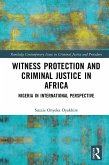Develop understanding of criminal Law and clarify complex issues
Criminal Law (Longman Law series), 8th Edition, by William Wilson and Laura Lammasniemi, combines coverage of the core legal principles with discussion of the theories and academic debates that underpin the subject. Enhance your understanding of criminal law and make use of the reading references to pertinent academic articles, hypothetical case examples that clarify complex issues, and end-of-chapter summaries.
New to this edition:
- On the law of causation, Grant (2021) further narrows down the circumstances within which defendant might be able to rely on overwhelming supervening event whereas Field (2021) and Rebelo (2021) provide further insight into Kennedy (2007) direction and victim interventions
- On defences, Keal (2022) provides a narrower interpretation of the cognitive elements of the M'Naghten rules and Magson (2022) clarifies trespasser rule in relation to householder defence
- On non-fatal offences against the person, s.71 Domestic Abuse Act 2021 codifies the much debated principle from Brown (1993) on consent to serious harm
- On sexual offences, Lawrance (2020) attempts to provide some clarity rules on deception and consent raising further questions on the matter, R (End Violence Against Women Coalition) v DPP (2021) sees a challenge to CPS policy on rape prosecutions, and AG Reference No. 1 of 2020 confirms intent is not required for the sexual element of sexual assault
- On diminished responsibility, Challen (2019) provides important discussion on coercive control and diminished responsibility, Joyce and Kay, and Foy (2020) clarifies when intoxication can be considered in cases of diminished responsibility
- On gross negligence manslaughter, Broughton (2020) introduces clearer yet potentially more restrictive interpretation of causation and Kuddus (2019) discusses serious and obvious risk of death
- On theft, Barton and Booth (2020) affirms the test from Ivey (2017) is the correct test for dishonesty in the civil and in criminal courts
- On criminal damage, AG Reference No. 1 of 2022 states that Articles of the European Convention of Human rights do not provide protection to those who cause criminal damage during protest which is violent or not peaceful
- On complicity, Hussain and Others (2023) discusses measurable contribution to the commission of a crime
- On encouragement, Rowe (2022) confirms that it suffices encouragement was given and it does not matter if encouragement caused or contributed to the commission of the offence
- On inchoate offences, Johnston and others (2020) confirms that a common, rather than parallel or similar, purpose and design is required for conspiracy; and Gates (2021) that conspiracy conviction can stand even if co-conspirators were found not guilty
William Wilson is Emeritus Professor of Criminal Law at Queen Mary, University of London.
Laura Lammasniemi is an Associate Professor at University or Warwick and Course Convenor and Chief Examiner for criminal law on the University of London International Laws Programme.
Pearson, the world's learning company.
Dieser Download kann aus rechtlichen Gründen nur mit Rechnungsadresse in A, B, BG, CY, CZ, D, DK, EW, E, FIN, F, GR, HR, H, IRL, I, LT, L, LR, M, NL, PL, P, R, S, SLO, SK ausgeliefert werden.









